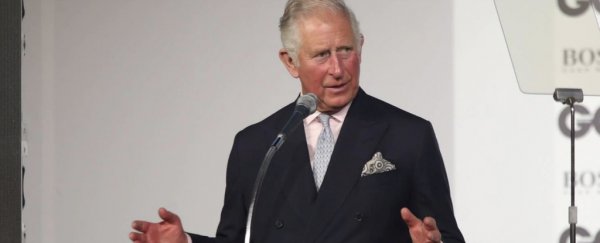From the perspective of critics, there are many reasons to be concerned about the rise of artificial intelligence.
Billionaire inventor Elon Musk — perhaps the world's most vocal AI antagonist — has warned that the technology could become "an immortal dictator from which we would never escape."
Several years before his death, Stephen Hawking, the renowned theoretical physicist, said artificial intelligence could bypass biological evolution, leaving humans unable to compete.
Now Prince Charles, the 69-year-old heir to the British throne, has revealed another reason to fear AI. In an interview with GQ Magazine, Charles said he's deeply dismayed by the way artificial intelligence is beginning to change the way people interact with machines.
"The thing I find hardest now is to cope with this extraordinary trend that somehow we must become part human, part machine, which I totally and utterly object to," the Prince of Wales told the magazine.
"It is crazy to go that far because I think, ironically, the more AI and robotics they want to introduce, the more people will rediscover the importance of the traditional crafts, the directly human things that are crafted by humans and not by machines."
Charles was speaking to GQ magazine after the publication awarded him a lifetime achievement award for services to philanthropy.
Long considered an environmentalist, Charles has been promoting organic farming since the 1980s and has made a point of "urging action on global warming" since at least 1990, according to Time.
In his interview with GQ, his skepticism of AI appears to be less about fears of a dystopian future and more about reinforcing his values surrounding environmental stewardship.
Charles said he has "always believed that living on a finite planet means we have to recognize that this puts certain constraints and limits on our human ambition in order to maintain the viability of the planet."
"That is why it matters so much that the way we operate has to be in tune with the way nature and the universe works and not the way we think it ought to work, which is what we have been doing," he added.
Among his many warnings about the rise of artificial intelligence, Musk — who appeared in a documentary this year about the danger of AI — has said that autonomous machines are more dangerous to the world than North Korea and could unleash "weapons of terror."
Musk has also compared the adoption of AI to "summoning the devil."
But Kevin Kelly, the executive editor of Wired magazine, has offered a decidedly optimistic view of technology's evolution, signaling that the debate over AI is robust within the tech world.
"I think that we, ourselves, are technology," Kelly told a reporter at the World Government Summit in Dubai earlier this year, appearing to imply that technology is an extension of biological evolution and central to what makes humans unique among animals.
"We have invented ourselves. We have invented our humanity."
"If we took all technology from our lives away, everything — fire, knives — humans would only last six months," Kelly added. "We would be eaten by animals. We only can defend ourselves because of technology."
2018 © The Washington Post
This article was originally published by The Washington Post.
